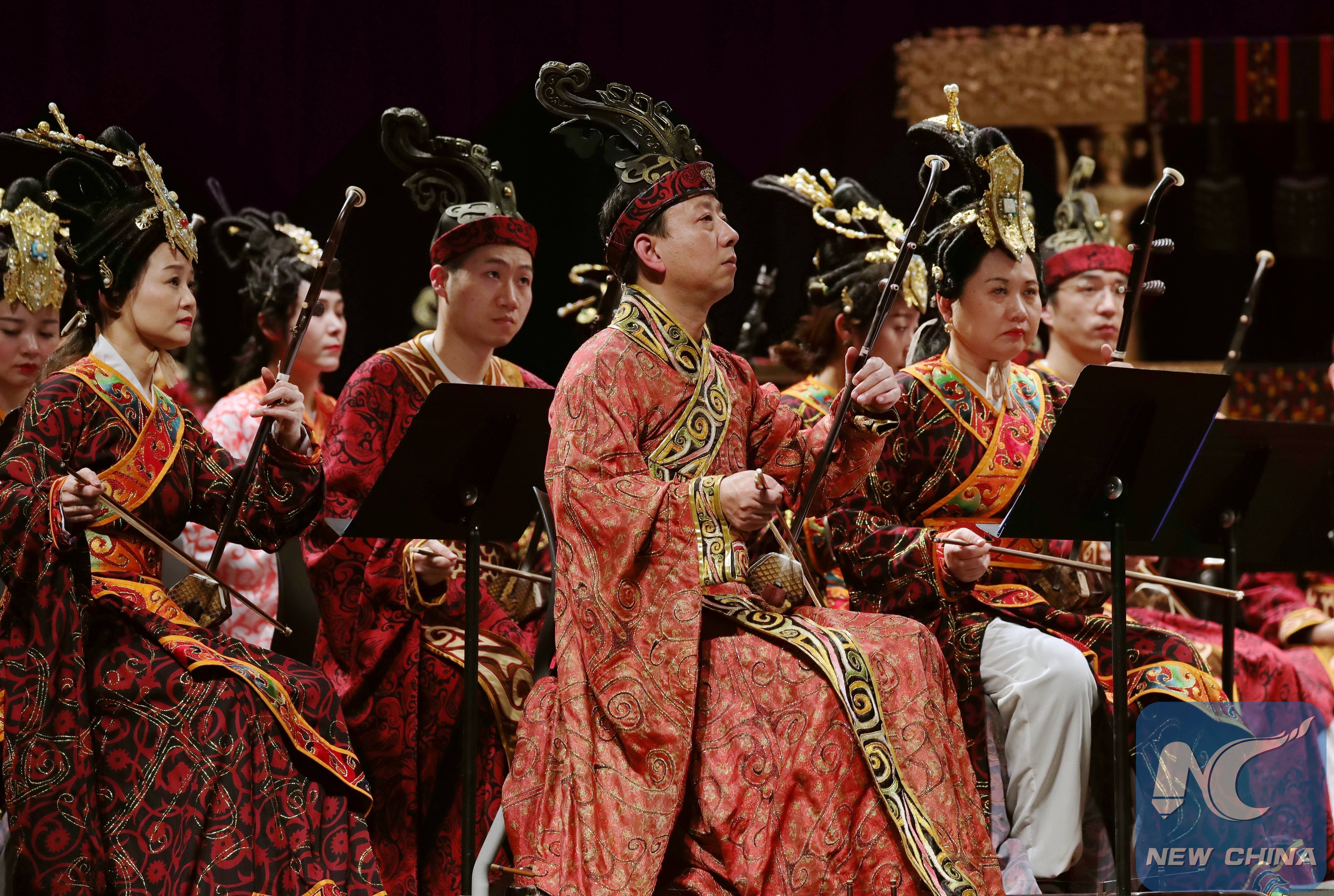
Members of the Hubei Chime Bells National Chinese Orchestra perform at the auditorium of the Central Middle School in Muscatine, the United States, Feb. 14, 2019. (Xinhua/Wang Ping)
CHICAGO, March 3 (Xinhua) -- Watching a Chinese New Year concert more than half a month ago, Chinese American composer and violinist Yang Gongqian is still in a state of excitement.
"The concert was a success. It inherited Chinese tradition and did a good job in artistic expression," he said.
Yang is also envisioning how he could have done to make the American audience better understand, enjoy and accept this Chinese New Year concert, which was jointly presented by the Hubei Chime Bells National Chinese Orchestra and the China National Peking Opera Company at Chicago Symphony Center, if he were the conductor.
Exotic is what many American audience feel about the concert when they hear traditional Chinese music, Yang told Xinhua. He has been using some modern techniques to hybridize traditional Chinese music, and facilitate more extensive spread and acceptance of Chinese music in the Western world.
"The Butterfly Lovers" violin concerto is a crossover masterpiece, a perfect fusion of China's Huangmei Opera with Western symphonic writing, Yang said. It is one of the most famous piece of Chinese music, as well as a world renowned masterpiece.
Yang has made some efforts in this field by redeveloping and orchestrating Chinese folk music "Kangding Love Song" into a symphonic work. The redevelopment has the original folk music as the main theme, but features a second theme he has created. He used solo violin and piano to express an antiphonal style.
Chicago's Lincolnwood Chamber Orchestra premiered the "Fantasy for Violin and Piano with Orchestra", the symphonic work Yang recomposed from "Kangding Love Song" at a local 2018 Chinese New Year concert, drawing enthusiastic applause.
Nurhan Arman, a well-established Canadian conductor and founder of Sinfonia Toronto, praised the music "a lovely piece".
Yang's devotion to music started when he was a child. He entered China's Central Conservatory of Music in 1982, majoring in violin, and then worked for China National Symphony Orchestra after graduation, playing first violin.
Talking about his study and work in China, Yang said the biggest reward he got is "discipline". "It is the basis of all," he stressed.
Recitation of the poems of Tang Dynasty and the verses of Song Dynasty in childhood has left a profound influence on Yang's music composition, endowing him with a unique music style of his own.
"Those poems and verses have melted into my way of creative thinking process, and enabled my mind to travel through time and space. When composing, the artistic image of Li Bai is alive in my mind," Yang told Xinhua.
Li Bai, a Chinese poet in the Tang Dynasty (618-907), pushed traditional Chinese poetic forms to new highs. There are around a thousand poems attributable to him, which are models for celebrating the pleasure of friendship, the depth of nature, solitude, and the joy of drinking.
With the desire to see the world, Yang came to the United States in 1988, and became a student of Dorothy Delay, a legendary violin teacher.
In 2005, Yang had his first original music album "Sonic Poem" published, which was selected one of the "Top 10 Master Albums" on CD Baby in the year.
When China National Symphony Orchestra had its tour of the United States in 2006, it performed the "Nature and Me Symphonic Poem" from the album.
Yang has so far composed some 80 music pieces, some of which are re-orchestrated from traditional Chinese music. Augusta Read Thomas, an American composer as well as a professor of the University of Chicago, praised his music as "song without words".
Listening to Yang's music, one can feel quietness, elegance and comfort in "Morning Lake" and "Wave and Clouds"; or open-mindedness in "Nature and Me Symphonic Poem" and "Dawn Awakening".
Yang said the path to discovering a music language of his own is extremely difficult. Fortunately, he found the music language of his own. "This is the best reward I've got."
Now with both oriental cultural accumulation and Western music composition techniques in hand, Yang dreams of bringing traditional Chinese music into the mainstream society in the Western world.
"Music under different limelight gives people different feelings," Yang said. "Traditional Chinese music just needs a medium." He plans to go on re-orchestrating traditional Chinese music with artistic means of the Western world, making the Western audience understand Chinese music in their way.
"Mutual understanding is essential," Yang stressed. "Only when people understand each other can they accept each other."

